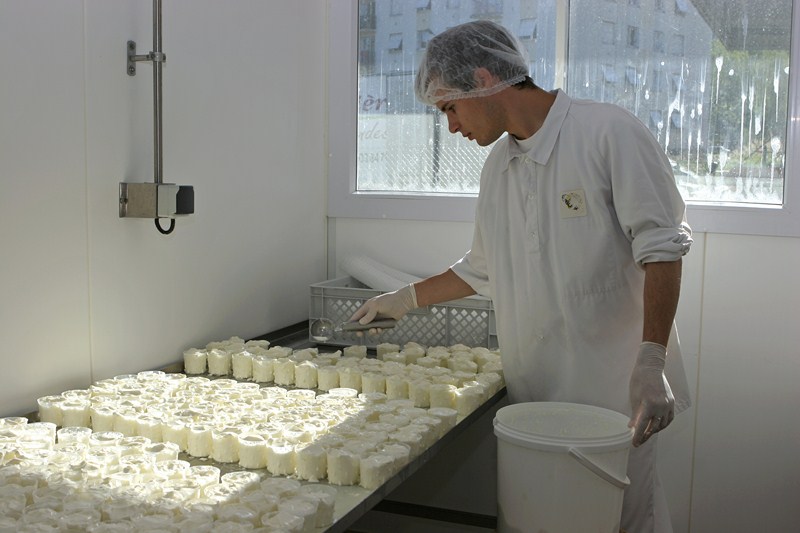Production and sale of farmhouse dairy products
Level 5
Production and sale of farmhouse dairy products
Who is this training course for ?
- Anyone with a project to set up a Farmhouse dairy production facility:
- farmhouse dairy product producer (cow’s milk, goats milk and ewe’s milk) who wishes to produce transformed dairy products on the farm;
- a producer who wishes to acquire extra training;
- a project-holder who wishes to develop a Farmhouse transformed dairy product line.
- Access to the BTSA (Agricultural BTEC Higher National Diploma equivalent) course is equally open to candidates having finished their educational cycle leading to one of the qualifications above and after having obtained a favorable decision by the establishment’s admissions commission.
What is the goal of this course ?
This course aims to:
- provide knowledge of milk as a raw material;
- help understand, analyse and master a dairy technology
- foresee the requirements for an adequate sales system.
Which professional openings does this course lead into ?
- Produce and sell Farmhouse dairy products:
- either by creating your own enterprise;
- or by being a salaried employee in a Farmhouse or artisanal organisation.
How is this course organised ?
- 7 weeks of training, one week per month, in a training centre.
- The cheesemaking technology modules take place at the Poligny ENILBIO during 5 weeks.
- The management and sales modules take place at the Vesoul CFPPA during 2 weeks.
- FINANCING: financed by the Regional Council of Bourgogne Franche-Comté, or a Training Insurance Fund (“Fonds d’Assurance Formation”).
Summary
|
Status during the training |
Trainee |
|
Lodging/Meals |
Possible at the ENILBIO and the Vesoul CFPPA |
|
Duration of the course Organisation of the course |
7 weeks One week of training per month. |
|
Commencement of the course at the training centre |
November |
|
Location of training centres |
Poligny ENILBIO and Vesoul CFPPA, France |
|
Obtention of the qualification |
Training course certificate and/or 2 UCARE (Regionally Transferrable Skills Units) for the BP REA (Professional Diploma for the Management of a Farming Enterprise) |
For further information
 |
ENILBIO
|
Total hours

|
PROGRAMME / TOTAL HOURS Over 7 weeks Technology modules (200 hours) · Knowledge of milk: chemical and bacteriological composition; quantitative and qualitative variations; checks, resources. · Study of the various Farmhouse cheesemaking technologies: practical applications; practical exercises: production runs. · Study of and mastery of yeasts: their nature, preparation, tests, practical applications and use. · Draining cheeses: targets; resources; tests. · Salting & Maturing cheeses: mastery; targets; resources; tests; packaging; finished-product quality. · Production facility hygiene: cleaning-disinfection; resources; tests.
Management and sales modules (80 hours) · Creation of a dairy production facility: methodology and aspects of project management. · Financial study: the profitability of a project. · Analysing the market. · The definition and development of a commercial strategy. · Developing a label, sales materials and all other means of communication. |
Testimonial
 “I’m a farming engineering graduate from LaSalle Beauvais. I also have a double diploma from Audencia in Nantes, a business school. After that, I worked 2 years as a consultant in a consulting agency(EY) and 2 more years as a project manager in the Crédit Agricole bank before returning to farming to set up my projects of transforming milk into Camembert.
“I’m a farming engineering graduate from LaSalle Beauvais. I also have a double diploma from Audencia in Nantes, a business school. After that, I worked 2 years as a consultant in a consulting agency(EY) and 2 more years as a project manager in the Crédit Agricole bank before returning to farming to set up my projects of transforming milk into Camembert.
That is when I chose the ENIL, for several reasons: The school’s excellent reputation and above all for the “Farmhouse dairy transformation” training course suitable for people who are already working. The scheduling of the training course between December and May allowed me to make myself available by taking regular vacations. What I like about the training course, is the alternation of practical and theoretical, which was highly beneficial. I also really liked the direct practical applications of the theory during the courses and the quality of the trainers. What I liked even better was the adaptability of the trainers to each of our various products and professional experiences as “farmers”.
If I had to sum it all up in one sentence I would say that it’s an excellent training course, and a key step before any and all transformation product launches!”
Charles



